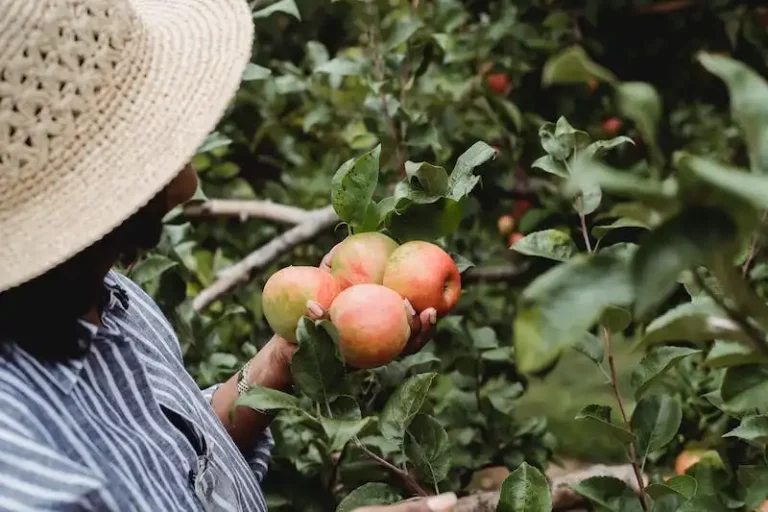If you’ve ever spent a day at the apple picking farm, you know that sometimes you end up with more apples than you can reasonably consume before they go bad. But don’t let those extra apples go to waste! There are several ways you can freeze and store apples to enjoy their sweet and juicy goodness all year round.
One way to freeze apples is by slicing them. If you prefer to eat your apples in slices, this method is perfect for you. Simply peel and core the apples, then cut them into your desired thickness. Coat the slices with lemon juice to keep them from browning, then place them in airtight containers or freezer bags. The frozen apple slices can be used for making pies, crisps, or even as a healthy snack straight from the freezer.
If you prefer to keep your apples whole, you can also freeze them as is. Just wash and dry the apples, then place them in freezer bags or containers. It’s important to give them a quick blanch in boiling water for three to five minutes before freezing to preserve their texture and flavor. When you’re ready to use the apples, just thaw them in the fridge overnight or cook them directly from frozen.
Another method for freezing apples is by making applesauce or stewed apples. Peel and core the apples, then chop them into small pieces. Cook the apples until they are soft and juicy, then let them cool down. Portion the applesauce or stewed apples into airtight containers or freezer bags and freeze them for later use. This way, you can enjoy a taste of summer even during the cold winter months.
Regardless of which method you choose, it’s important to store the frozen apples properly to ensure their quality. Freeze them in small portions so you can easily thaw only what you need. Make sure to label the containers with the date and contents, so you can easily identify them later on. Experts recommend using the frozen apples within 6 months for the best taste and texture.
So next time you find yourself with an abundance of apples, don’t let them go to waste. Freeze and store them using these tips, and you’ll have delicious apples to enjoy all year round.
Should You Refrigerate Apples to Keep Them Fresh Here’s What the Experts Say
When it comes to storing apples for the long winter months, there’s always a debate about whether they should be refrigerated or left on the countertop. Here’s what the experts say:
According to experts, most varieties of apples will stay fresh for a longer time if stored in the refrigerator. The cold temperatures slow down the ripening process, which helps to maintain their flavor and texture. However, there are a few exceptions to this rule.
Some experts say that certain apples, like Granny Smith or other firm varieties, can be stored on the countertop because they have a higher natural sugar content and are less prone to browning. These apples will generally stay fresh for a longer time when kept in a cool, dark place, away from direct sunlight.
If you choose to refrigerate your apples, it’s important to store them properly to prevent them from spoiling. The experts recommend placing the apples in a plastic bag with small holes or wrapping them individually in newspaper to keep them fresh. This helps to prevent moisture build-up, which can lead to the growth of fungi and spoilage.
When you’re ready to use the apples, it’s important to wash them thoroughly to remove any dirt or pesticides. You can use a scrub brush to gently scrub the surface of the apples under cold running water. Be sure to dry them well before consuming or storing.
If you prefer to freeze your apples for long-term storage, there are a few tips to keep in mind. First, you should always peel and core the apples before freezing. Then, you can choose to freeze them whole, sliced, stewed, or cooked into various fillings. Just be sure to use high-quality freezer bags or containers to prevent freezer burn.
Whether you decide to refrigerate or freeze your apples, the experts say that they will last for several weeks when stored properly. Just remember to check for any signs of spoilage, such as mold or an unpleasant odor, and discard any apples that have gone bad.
So, the next time you have a fresh batch of apples from the market, you can now confidently decide how to store them and keep them fresh for as long as possible.
The Best Way to Store Apples
When it comes to storing apples, the Granny Smith variety is one of the best options. These apples are known for their firm texture and tart flavor, making them perfect for pies and other baked goods. However, the same storage methods can be applied to other apple varieties as well.
The first step in storing apples is to choose the freshest ones available. Look for apples that are firm, free of bruises, and have a vibrant color. Avoid apples that are soft or have brown spots, as they’ll spoil quickly.
Once you’ve selected your apples, it’s important to store them properly to keep them fresh for as long as possible. One of the best ways to store apples is to place them in a cool, dark place, such as a cellar or refrigerator. To prevent apples from browning, you can scrub them gently under running water or use a solution of lemon juice and water.
If you’re storing apples for a long period of time, it’s best to use the freezer. Frozen apples can be used in pies, crisps, or even as a topping for oatmeal or yogurt. Before freezing, make sure to wash, peel, and core the apples. You can also slice them for easier use later on. Store the sliced apples in airtight plastic bags or containers, and label them with the date to keep track of how long they’ve been frozen.
An expert’s tip for freezing apples is to dip the slices in a mixture of water and lemon juice before placing them in the freezer. This helps to prevent browning and maintain the apple’s texture.
While frozen apples can be used in various recipes, they won’t have the same crisp texture as fresh apples. They are best used for cooked dishes like apple pies, apple sauce, or fruit fillings.
If you don’t want to freeze your apples, another option is to store them in a crisper drawer in your refrigerator. This will keep them fresh for up to several weeks. Just make sure to keep apples away from other fruits and vegetables, as they produce a gas called ethylene that can cause them to ripen and spoil more quickly.
So, whether you choose to freeze or store your apples in the refrigerator, the key is to keep them cool and dry. By following these simple tips, you can enjoy the taste of fresh apples long after they’re out of season.
Refrigerator vs Countertop
When it comes to keeping your apples fresh, you may be wondering whether it’s best to store them in the refrigerator or on the countertop. The answer depends on how soon you plan to use them and what variety of apple you have.
If you’re planning on using the apples within a week, storing them in the refrigerator will help keep them fresh. Apples can be stored in the crisper drawer of your refrigerator, away from other fruits and vegetables, as they release a gas called ethylene that can cause produce to spoil faster.
On the other hand, if you prefer your apples to be crisp and juicy, you might want to store them on the countertop instead. Green apples, like Granny Smith, tend to stay crisp longer when they’re stored at room temperature. Just be sure to keep them away from direct sunlight, as excessive heat can cause them to ripen too quickly.
If you have a large quantity of apples and want to preserve them for a longer period of time, you can consider making applesauce or storing them in the freezer. This article will focus on storing fresh apples, but if you would like advice on freezing or making applesauce, please leave a comment below.
To store fresh apples in the refrigerator, it’s important to scrub them clean to remove any bacteria or dirt. Then, dry them thoroughly and place them in a plastic bag or container. Granny Smith and other green varieties will last longer if you store them in a plastic bag with a few small holes to allow for ventilation.
When it comes to storing apples on the countertop, it’s best to keep them away from other fruits, as some fruits produce ethylene, which can cause the apples to ripen too quickly and brown. It’s also important to check the apples regularly and remove any that have started to brown or show signs of spoilage.
Whether you choose to store your apples in the refrigerator or on the countertop, it’s always a good idea to use them as soon as possible. Even with proper storage, apples will eventually start to soften and lose their crispness. If you notice that your apples are becoming too ripe for eating, consider using them in cooked dishes like pies or stewed apples.
Experts recommend using the freshest apples available when making pies or other apple-filled desserts. This is because cooked apples will soften and lose some of their flavor, so starting with the freshest apples will ensure the best results.
In summary, storing apples in the refrigerator will help keep them fresh for a longer period of time, while storing them on the countertop will maintain their crispness and juiciness. Consider the variety of apple you have and how soon you plan to use them when deciding where and how to store your apples.
Keep Apples Away From Other Fruits
When it comes to storing apples, it’s important to keep them away from other fruits. This is because apples release a natural gas called ethylene, which can cause other fruits to ripen and spoil quickly.
Here are some tips for keeping apples separate from other fruits:
- Choose a designated area in your refrigerator or pantry for storing apples. Ideally, this area should be away from other fruits.
- If you’re freezing apples for long-term storage, make sure to use a separate container or plastic bag for them.
- If you have both ripe and unripe apples, store them separately. Ripe apples release more ethylene gas, which can cause unripe apples to ripen too quickly.
- Before storing apples, remove any green leaves or stems. Green leaves can trap moisture and cause the apples to spoil faster.
- If you’re storing sliced apples, you can prevent them from browning by coating them with lemon juice or a mixture of lemon juice and water.
- If you’re using apples for cooking, such as making pies or crisps, you can freeze them without peeling or coring. Simply wash and slice the apples, then freeze them in a single layer on a baking sheet. Once frozen, you can transfer the apple slices to a freezer-safe container or plastic bag.
- When storing whole apples, it’s best to place them in a ventilated bag or container. This allows air to circulate around the apples and helps to prevent them from becoming too ripe.
- If you notice any apples starting to spoil, remove them from the storage area immediately. Spoiled apples can release even more ethylene gas, which can cause nearby fruits to spoil faster.
By following these simple tips, you can ensure that your apples stay fresh and crisp for longer. Whether you’re enjoying them as a healthy snack or using them in your favorite apple recipes, you’ll be able to enjoy the delicious taste of apples all winter long.



